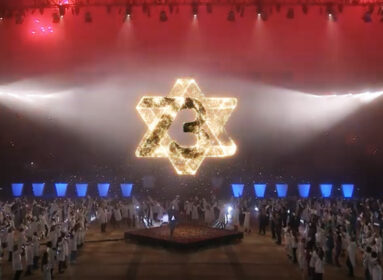
By Cindy Mindell
 EAST HARTFORD – Pratt & Whitney Stadium at Rentschler Field is best known as the home arena of the UConn Huskies football and soccer teams, and for hosting several home games of the U.S. Men’s and Women’s National Soccer Teams.
EAST HARTFORD – Pratt & Whitney Stadium at Rentschler Field is best known as the home arena of the UConn Huskies football and soccer teams, and for hosting several home games of the U.S. Men’s and Women’s National Soccer Teams.
But when the ball is at rest and the uniforms hung up, the stadium shines as a luxe space for meetings and celebrations. In addition to Pratt & Whitney corporate events, the stadium has seen a host of gala and fundraising events, from the annual East Hartford Mayor’s Charity ball and the Connecticut State Treasurer’s conference, to retirement parties and weddings.
Events are held in the tower, a 7,500-square-foot third-floor space boasting floor-to-ceiling windows. One side of the room looks out over Rentschler Field; the other offers a vista of the Pratt & Whitney Corporate campus. While on-site catering is provided by Spectra Venue Management and Powerstation Events is the official entertainment and production partner, clients may also bring in their own vendors for private events — including kosher caterers — and enjoy access to top-of-the-line AV equipment.
 “We’re open to anything and everything,” says Sarah Curiale, catering sales manager for Spectra Food Service. “Pratt & Whitney Stadium is a fun and different, unique space that is not your typical four-wall banquet room.”
“We’re open to anything and everything,” says Sarah Curiale, catering sales manager for Spectra Food Service. “Pratt & Whitney Stadium is a fun and different, unique space that is not your typical four-wall banquet room.”
The high-ceilinged, open area can be dressed up for a formal affair or dressed down for a relaxed event, depending on the client’s wishes. And just because the setting is sports-related doesn’t mean that the theme or décor must reflect that function.
“You feel like you’re in a sports-stadium setting without having to keep to a sports theme,” Curiale says. “While some of our clients like to play that up, others come to us for the ‘awe factor:’ you get to go into a stadium when there’s not a game going on, like a VIP, which makes the event that much more interesting. We hold a lot of corporate meetings and business-related events and when the hosts announce the venue location to potential participants, their attendance goes up by 10 percent.”
 Last month, Pratt & Whitney Stadium hosted the bar mitzvah celebration of West Hartford resident Ethan Raisner. Mom Amy Raisner learned about the venue from a friend who had attended an event there. The all-inclusive facility appealed to Amy, who didn’t want to have to rent seating or hire a caterer.
Last month, Pratt & Whitney Stadium hosted the bar mitzvah celebration of West Hartford resident Ethan Raisner. Mom Amy Raisner learned about the venue from a friend who had attended an event there. The all-inclusive facility appealed to Amy, who didn’t want to have to rent seating or hire a caterer.
“I met with the facility manager and the head caterer and from then on, it was very simple,” she says. “You don’t have to think about hiring a caterer and the menus are flexible.” The Raisners put together adults’ and kids’ menus from the extensive in-house fine-dining catering options and some items not listed on the menu.
Adults enjoyed drinks from the on-site bar and a sit-down dinner, while kids were served a buffet at the stadium’s concession stand. The Raisners brought in their own vendors – A Gala Affair to decorate the space, and Boppers Entertainment and Event Services to DJ.
 “That evening, I constantly heard guests saying, ‘I never even thought to come here’ or ‘I didn’t even know this existed,’” Amy says. “It really is a great facility with great people. They were on top of everything; the food was amazing, the service was great. I hope we can have another event there soon.”
“That evening, I constantly heard guests saying, ‘I never even thought to come here’ or ‘I didn’t even know this existed,’” Amy says. “It really is a great facility with great people. They were on top of everything; the food was amazing, the service was great. I hope we can have another event there soon.”
For Ethan, the experience was of the larger-than-life variety. “It was awesome,” he says. “Everyone there was so nice and they even were able to put my photo montage on the Jumbo Tron. It was so cool to see it up there.”
Second-time brides share what to wear for your special day
By Maayan Jaffe-Hoffman/JNS.org
 Every bride wants her wedding day to be special, whether it’s her first or second nuptials. There are many more considerations the second time around. Often, there are children involved. There’s also the question of what was done the first time and how you want to make wedding No. 2 the same—or totally different.
Every bride wants her wedding day to be special, whether it’s her first or second nuptials. There are many more considerations the second time around. Often, there are children involved. There’s also the question of what was done the first time and how you want to make wedding No. 2 the same—or totally different.
But there’s one topic that every bride-to-be considers: what to wear. When a woman gets married the first time, it’s traditional to wear a white bridal gown. For wedding No. 2? Anything goes.
“The bride should wear what she feels most comfortable in,” says Nicole Borsuk of Nicole Borsuk Personal Shopper in Atlanta, Ga.
Melinda Michel of Baltimore remarried in June 2015 at the age of 48. She says she used Pinterest to start her bridal dress search.
“I thought it was really fun shopping for wedding dresses, and Pinterest was like virtual window shopping,” Michel says, noting that when she explored the virtual photo shop she discovered wedding gowns, bridesmaid dresses, and cocktail attire in a variety of colors and cuts. She would pin the dresses she was drawn to and then try to find them in a local bridal store or department store.
“I think [second-time] brides should consider bridesmaid dresses,” says Michel.
For one, bridesmaid dresses are significantly cheaper—usually as much as 50 percent less expensive than a bridal gown. They still have that “bridal party feel,” without the virgin princess look.
Shari Klein, 50, seconds that notion. Remarried in June 2015 in New York, she ended up with a white bridesmaid dress deeply emblazoned with silver beading. She says that for two months, she went searching for the perfect ensemble.
“I needed something that was a little atypical and that fit my personality—sexy and flirty and fun, but I didn’t want to look like a grown-up trying to be a kid,” says Klein, whose dress ultimately gave her that “princess feel” she desired, effusing a combination of modesty, sophistication, and beauty.
Borsuk says second-time brides often opt for their favorite colors or ones they know look good on them. She has helped brides find dresses in trendy seasonal colors, including bright and vibrant colors. For example, pink quartz is in now, and she has seen many brides opting for that. There’s also a popular cool blue that’s making its way to the dress scene. Fair-skinned brides should go with pastel colors so that they don’t become washed out by their dress. Olive-skinned brides can go more vibrant.”
What do the kids wear to a second wedding?
“Let’s say a bride is not having a traditional wedding and she’s opted for a blue dress, then I would suggest the children have blue in their wedding outfits,” says Borsuk, explaining that even at a second wedding it is traditional to coordinate between the bride, groom, and bridal party.
Michel wore a blush pink dress and her groom wore a matching pink tie. The flower girl wore a dress from the same company that was ivory and pink. Klein’s older daughters wore gowns. Finally, accessorize. Michel says that one can go with a simpler dress and then accessorize with the right bridal belt or shoes. Borsuk recommends that if going with a simpler dress add some fun and tasteful costume jewelry. In Klein’s case, the shoes were the highlight. She selected high heels with sequence, silver straps and rhinestones.
Of course, by the end of the evening, Klein’s shoes were off and she was living it up, dancing with her new husband. The dress was comfortable enough to move so she could enjoy the night—something first-time brides sometimes forgo for beauty.
“To your first wedding, you invite the world. To your second wedding, you are very choosy in who you share it with. It also a celebration of who you are,” says Klein. “That was the day. That was the dress.…It was perfection.”
Jerusalem’s ‘bar mitzvah king’ shares tales of laughs and inspiration
By Maayan Jaffe-Hoffman/JNS.org

The “Jerusalem bar mitzvah king,” Rabbi Jay Karzen (left), with a bar mitzvah boy at the Western Wall. Credit: Courtesy Rabbi Jay Karzen.
Rabbi Jay Karzen, coined the “Jerusalem bar mitzvah king” by The Jerusalem Post in 1997, has stories to make you laugh out loud or cry tears of joy.
Karzen, 81, has performed thousands of bar and bat mitzvahs over the last 30 years. He was among the first rabbis to offer formal bar/bat mitzvah services at the Kotel for families coming from abroad to celebrate their special day.
Meeting with JNS.org is his Jerusalem home, Karzen says that when he made aliyah from Chicago 30 years ago, he needed a job. A then-prominent rabbi at the now-defunct Maine Township Jewish Congregation in Des Plaines, Ill., he had performed many Jewish lifecycle celebrations and figured a bar mitzvah business would be a good avenue to explore.
“Families would come and bring their groups to the Kotel, and I saw the ceremonies were sometimes un-meaningful. It was chaos. I figured I could upgrade the bar mitzvah experience,” says Karzen.
Karzen inspires kids by telling them “that to be a Jew means to love God. To love God, you have to follow the Torah, which He gave us. I tell them it is fun to be a Jew,” Karzen says. “There’s a lot of singing.”
Some of the inspiration comes simply from being at the Kotel. “Israel is the holy land. Jerusalem is the holy city. The Kotel is the holiest spot in the holiest city in the holy land. It’s a beautiful thing,” he says. “When you go to the Kotel and see thousands of people around you davening (praying)—Sephardim, Ashkenazim, Hassidim—all worshipping God, it cannot help but have an impact on the child.”
Karzen also performs bar/bat mitzvah ceremonies at Robinson’s Arch, Masada, and other sites around Israel. Ultimately, he wrote a book about his experiences, Off the Wall, which was published in 1999.
Karzen shared with JNS a number of his best tales, such as the time a family asked if they could rent the entire Kotel because they were expecting several guests and wanted a private party.
“A South African family was among the first to book me for their bar mitzvah. In the process of printing invitations for their forthcoming event in Jerusalem, they faced me with a simple question: ‘What’s the address of the Kotel?’” Karzen recalls. He assured the family that no address was really necessary, and that “Kotel” or “Western Wall” would suffice. But the family would not accept his answer. Karzen called various government offices from Jerusalem City Hall to the Ministry of Religion, all of which enjoyed a chuckle at his expense. Though they couldn’t give him an answer (because the Kotel indeed has no address).
“So I composed an address: The Western Wall: 1 Kotel Plaza. Believe me, that is exactly what the invitation read,” he says with a laugh.
Then there was the boy who came with his tzitzit snipped from his tallit because his mother “didn’t want all those extra strings hanging down.”
“Crazy things happen,” Karzen says. And even crazier emails. A sampling of messages that have graced Karzen’s inbox: “Since we aren’t a very religious family, is it possible to have a ‘non-religious bar mitzvah?” and “We have many important participants coming to our son’s bar mitzvah.…We know that traditionally only three [aliyot to the Torah] are distributed on a weekday. We are requesting an exception to this rule.…I am sure that God will overlook these minor variations and bless you for your understanding in accommodating us.”
But Karzen says his successes make it all worth it. One time, a grandfather made arrangements for a bar mitzvah at the Kotel for his grandson, informing Karzen that while the father would be there, he was anti-religion and “hostile.” The ceremony started off with the father behaving just as described, but Karzen tried to engage him in the ceremony. At the end of the event, the father stood up and told attendees how when he was 13, he was supposed to celebrate his bar mitzvah, but his grandfather died the night before his big day and the event was cancelled. He then learned a second Torah portion, only to have his grandmother die just before he was supposed to recite that one. The father had figured this was God’s way of telling him he didn’t need to have anything to do with Judaism. Yet after witnessing his son’s ceremony, the father was in tears and had changed his mind.
“He said that after seeing his son’s bar mitzvah, he realized how much he missed Judaism and how beautiful it is,” recalls Karzen. “He said he just wanted to hug me and thank me for reintroducing him to religion.”








 Southern New England Jewish Ledger
Southern New England Jewish Ledger








